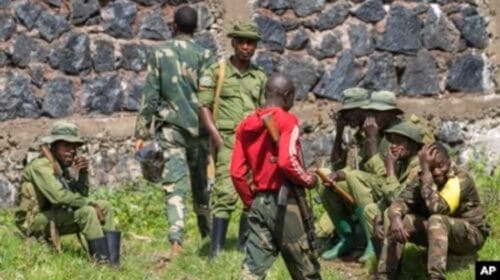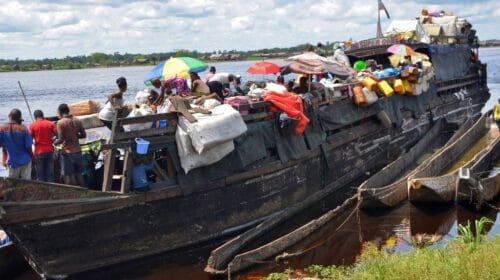Exclusive: Congo’s army accused of abuse as rebels regroup in Rwanda: U.N. experts
 (Reuters) – Recently defeated M23 rebels in eastern Democratic Republic of the Congo have continued to recruit fighters in neighboring Rwanda while the Congolese army has been involved in human rights abuses and corruption, according to a confidential U.N. report.
(Reuters) – Recently defeated M23 rebels in eastern Democratic Republic of the Congo have continued to recruit fighters in neighboring Rwanda while the Congolese army has been involved in human rights abuses and corruption, according to a confidential U.N. report.
“The Group has documented that M23 received continued support from Rwandan territory,” the U.N. Group of Experts said in its final report to the Security Council’s Congo sanctions committee, which was seen by Reuters on Monday.
“The Group has received credible information that sanctioned M23 leaders are moving freely in Uganda and that M23 has continued to recruit in Rwanda,” it said.
The independent expert panel also accused armed groups and the Congolese army of human rights abuses – including use of child soldiers, summary executions and sexual violence – and profiting from illegal mining operations in resource-rich eastern Congo.
The allegations come at a sensitive time for Congo, which is struggling to defeat armed militia in its eastern provinces. Millions of people have died from violence, disease and hunger since the 1990s in eastern Congo where myriad rebel groups have fought over gold, diamonds, copper, cobalt and uranium deposits.
The U.N. experts have repeatedly accused neighboring Rwanda of backing the rebellion by M23 in eastern Congo, a claim the Rwandan government has fiercely rejected. The U.N. Security Council has blacklisted M23.
Rwanda’s U.N. mission had no immediate reaction, though a Rwandan diplomat told Reuters he dismissed the charges: “We are tired by these same allegations.”
Western officials say that Rwanda’s denials are not credible, and U.S. and European governments imposed punitive measures on Kigali to pressure it to halt its support for M23.
Rwanda has repeatedly intervened in Congo, saying it had to hunt down the Hutu militia who fled after the 1994 Rwandan genocide. Rwanda and Congo have fought two wars over the past two decades in Congo’s east.
A spokesman for the Ugandan mission said he could not comment on a report that has not been formally released yet. Congolese diplomats were not immediately available for comment.
The report estimated that 98 percent of the gold produced in Congo in 2013 was smuggled out of the country and nearly all of it traded in Uganda.
“The Group also estimates that the value of gold smuggled out of Congo during 2013 to be between $383 (million) and $409 million,” the report said, adding that the resulting tax revenue losses amounted to as much as $8.2 million.
“Armed groups and FARDC continue to control many mining sites and to profit from mining and the minerals trade,” it said.
“Smuggling of minerals – particularly tin, tungsten and tantalum – from eastern DRC through neighboring countries continued in during 2013, and undermines the credibility and progress of international certification and traceability mechanisms.”
SEXUAL VIOLENCE, RWANDAN TANKS
Congolese troops and the U.N. peacekeeping mission – which includes a unique Intervention Brigade mandated to eliminate armed groups – last month defeated M23, which signed a peace deal with the Congo government on Thursday.
The Tutsi-led M23 rebel group ended its 20-month rebellion, the most serious in Congo in the last decade, after Congolese soldiers and U.N. peacekeepers, known as MONUSCO, captured its last hilltop strongholds, near the Rwandan border.
“The most consistent forms of support were through recruitment and provision of arms and ammunition, particularly during periods of combat,” said the 48-page report, dated December 12.
“M23 also received direct troop reinforcement by Rwandan soldiers in August,” the group said. “During the October fighting, Rwandan tanks, fired into DRC in support of M23.”
The report cited “serious violations of international humanitarian law, including the recruitment and use of child soldiers, summary executions, sexual violence, and targeting of civilian populations.”
“While armed groups carried out many of these crimes, the Group also identified the FARDC (Congolese army) as a party to numerous violations,” the report said. “Government security forces, particularly FARDC, remain a significant source of sexual violence, notably against minors.
Rwanda has accused Congolese troops of collaborating with the Democratic Forces for the Liberation of Rwanda (FDLR), a charge Kinshasa has denied. “During 2012, the group documented cases of local-level collaboration between FDLR and FARDC,” the expert’s report said.
Hutus who fled Rwanda after the genocide of 800,000 Tutsi and moderate Hutus make up about 30 percent of the FDLR fighters, according to the United Nations.
The experts said the defeat of M23 had sent a strong message to other armed groups in eastern Congo.
“While some have become more aggressive and others have moved into defensive postures as a result of fears of attack by FARDC and (the U.N. Intervention Brigade), several armed groups have started to surrender and expressed willingness to integrate into the Congolese army and police,” the experts’ report said.
The expert panel said that, through attacks on medical facilities, the Islamist extremist Allied Democratic Forces (ADF) was clearly stockpiling drugs and medical equipment to either prepare for an attack by the U.N. Intervention Brigade or to prepare for its own offensive military action.
The U.N. peacekeeping mission in Congo has set up a task force to learn more about the ADF, which the U.N. experts described as “a large, highly organized, and dangerous force.
“The group has not found evidence that ADF has links with either al Shabaab or al Qaeda,” the experts report said.
Source: reuters.com



